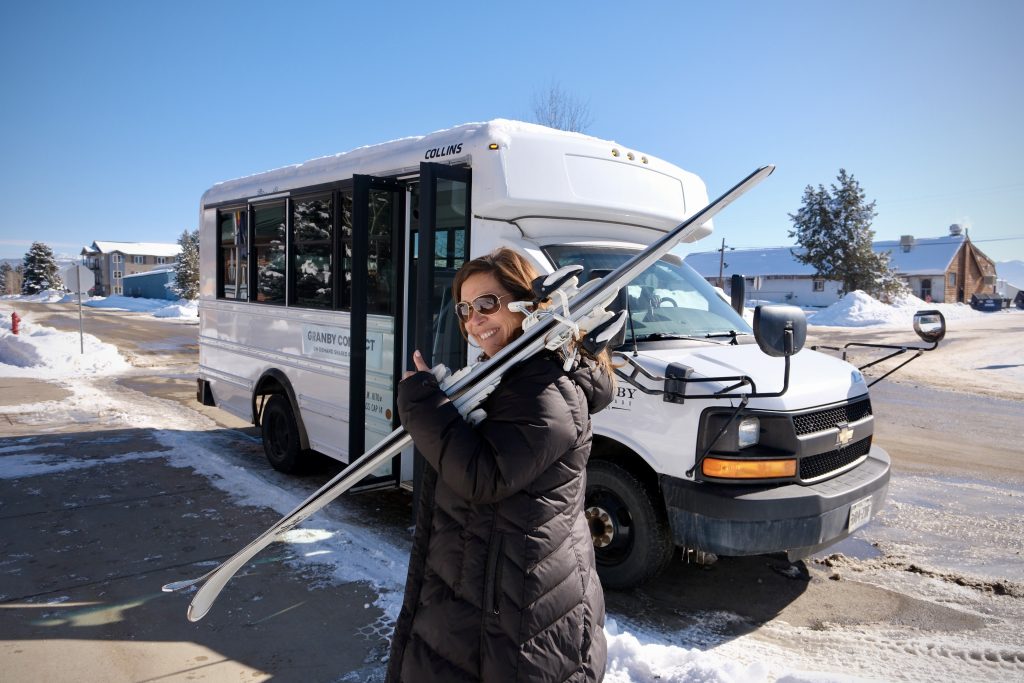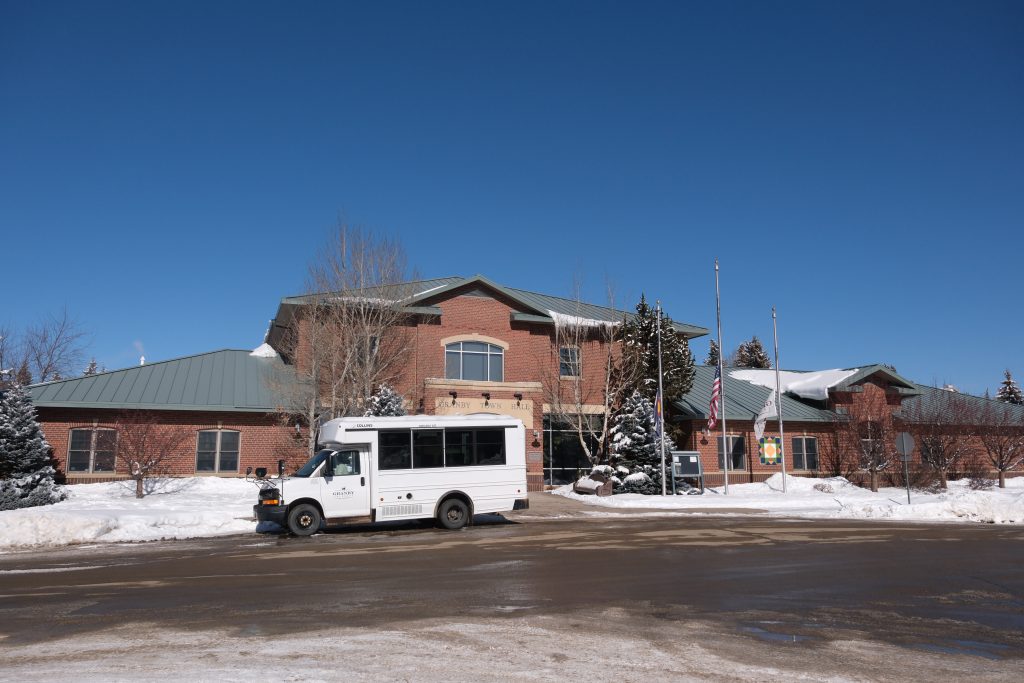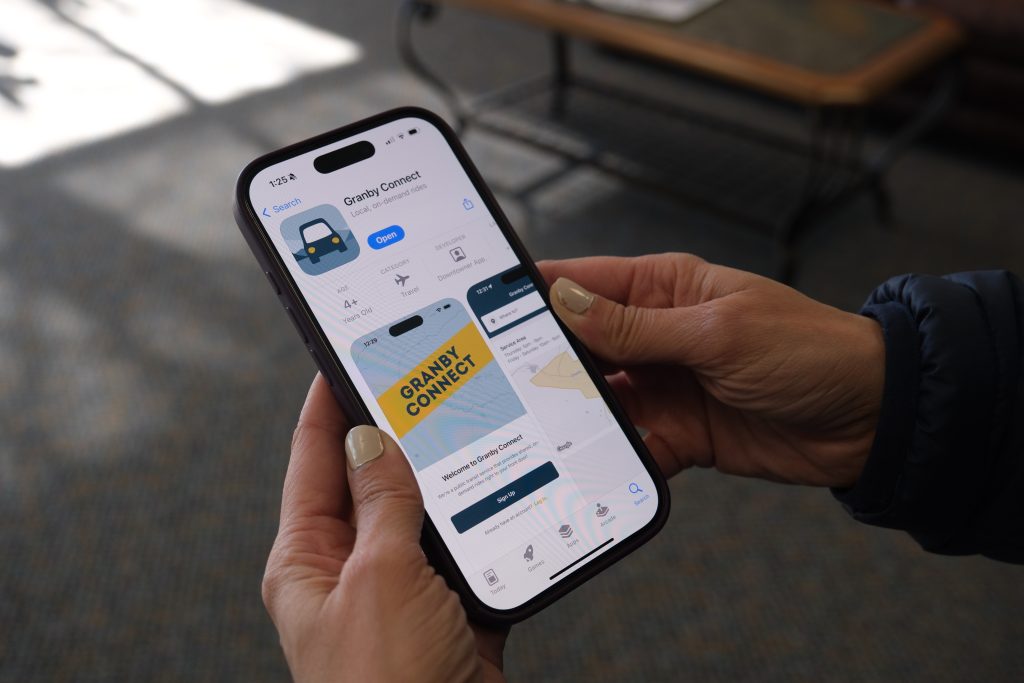Trustees approve bus purchase and expanded schedule for Granby Connect after stall
The Granby Connect on-demand microtransit service has stopped service due to board hesitation on how to move forward with the program.

Destination Granby/Courtesy photo
Three weeks ago, the Granby Board of Trustees discussed the future of the Granby Connect, an on-demand microtransit bus program. The May 13 meeting ended with the board deciding to table the matter due to indecision about how often to run the buses and discomfort with the associated costs.
Assistant town manager Nicole Schafer brought the item back the board on Tuesday, May 27, where she explained that the pilot program had been stopped in mid-May due to staffing and vehicle constraints. Due to her efforts, and the support of enthusiastic riders, the board agreed to resume the program this summer, potentially in July.
Schafer said that the current bus drivers “respectfully” asked for their weekends back for the summer and that she was hesitant to hire new drivers due to the program’s future uncertainty. The town is now considering hiring more drivers for the weekends and shifting the original drivers to weekdays. The bus also had to be returned to the recreation department.
According to a memo from the May 27 meeting, Granby Connect has provided 684 rides and transported 1,035 passengers so far. Ridership has remained consistent throughout the pilot and drivers who carry out 15 to 20 rides per day.
Schafer explained at the May 13 meeting that she took the board’s feedback from a previous meeting and worked on financial estimates for 7-day-a-week coverage at a $2 cost per ride. She said that staff have completed a financial estimate for the program using the determined parameters, negotiated an extension with Downtowner, the service provider for the app, sent donation requests to local businesses, adjusted the designated service area and have lined up another driver in order to cover additional shifts for the 7-day expansion.
As she explained the proposal, Schafer said she occassionally drives a bus for the chance to talk to riders directly and said that this program “changed people’s lives.”
While driving, Schafer met a 38-year-old man recovering from knee surgery who told her that he had been using his crutches to walk to the 7-Eleven in Granby because it was the only place he could get food nearby. The man said he had been “counting down the hours” to Thursday so he could use the Granby Connect service to get a ride to City Market.
“I want to make sure we’re fisically responsible. I want to make sure that we are finding as many ways as we can to offset the expenses associated with this program, but I don’t want to minimize the difference you’re making in people’s lives,” Schafer said.

The Granby assistant town manager also shared another story while dining at Brickhouse 40 about how staff from the restaurant walked up to her to personally thank her for the microtransit program. They shared stories about how it has changed the way employees get to work, as well as how it’s gotten patrons get home safely.
Mountain Familly Center had been working with the town to develop a system that would calculate how many qualified seniors used Granby Connect, so that the center could then reimburse the town.
Trustee Seth Stern asked if it would be possible to implement a feature that charges out-of-town visitors more than Granby residents. Schafer said that implementation would be extremely difficult from a programming side and time consuming. Schafer added that she also sees this as a public service that benefits both visitors and residents.
Trustee Sharon Silva asked if raising the cost per ride to $3 would help fund the program, which Schafer said would generate an extra maybe $16,000 to $18,000 a year. She explained that town staff are still looking for additional creative opportunities for cost savings on this project and said that she believes their time is better spent seeking out grants or other opportunities.
“Adding a dollar really doesn’t make a difference. I really believe that my time is best spent findings ways to get sponsorships and getting some of our business beneficiaries to offset the cost,” Schafer said.
After previous discussions, Schafer explained that some of the only feedback she got were people asking the town to not raise rates.
“It’s great to be able to spend $4 to go to City Market. It’s great to spend $4 to go to Granby Ranch. Even if I’m spending $6, there’s a barrier there. Most of the people using this are those who have limited disposable income and $4 roundtrip is a lot if they’re using it to get to the doctor’s office, to get to City Market and they’re using it to go visit a friend,” Schafer said.
While still trying to think of cost-saving solutions for the program, trustee Rebecca Quesada asked if the town has applied for any grants. Schafer explained that since the town does not have an ADA-accessible van that the town is ineligable for most grants.
When asked his opinion, finance director Derek Assmann explained that he would prefer to run a program similar to the pilot program for the remainder the of the year, instead of expanding to seven days a week. Mayor Joshua Hardy said that he had similar concerns about jumping into a 7-day-a-week program. Hardy was worried that if this schedule failed then the program may never recover.
The proposed cost for servicing the remainder of the year added up to $130,000 and town staff reccomended making this a budgeted item for 2026. Staff were able to lower the anticipated costs for this year from the original estimate of $180,000 to $130,000.
During the May 13 meeting, trustees voted to table the item until the next meeting in a 4-2 vote with trustees Chris Michalowski and Michael Mahoney voting against tabling.

Granby trustees give green light to continue program with expanded service
At the May 27 meeting following the board’s decision to table the matter, Schafer explained that Granby Connect was no longer operating due to staffing and transportation constraints. The drivers who worked throughout the program “respectfully” asked for their weekends back for the summer and town staff were hesitant to hire new drivers because of the uncertainty of the program’s future.
Town manager Ted Cherry explained that staff were having a hard time planning because they were unsure of the board’s direction.
“I think we’re struggling a bit on if the board is wanting to do this program or not. So, I think that’s what we’re asking tonight — if you want to continue the program,” Cherry said.
Because the board previously decided to remove the lease of a wheelchair-accessible vehicle from the financial model; grant opportunities are still limited, according to a staff memo. Previously the board directed staff to keep a recreation department van and to seek out a lease another seven-passenger van. The board declined to seek out leasing a 12-passenger mini bus with ADA access at the April 22 meeting.
Schafer presented letters of support for Granby Connect from Mountain Family Center and Middle Park Health to the board.
Aspen Bias, director of hunger relief and nutrition at Mountain Family Center, previously wrote a letter of support saying that the microtransit service “has been specifically helpful to older adults in Granby. Grand Seniors, a branch of Mountain Family Center, offers transportation for running errands and for non-emergency, medical transportation to older (60+) residents of Grand County and residents with disabilities.”
“It is our hope to see the Granby Connect continue to succeed and to expand as a safe, affordable transportation option for people in our community,” Bias wrote.
Andy Thomasson, a medical social worker at Middle Park Health, also wrote a letter of support in which he stated that in his role he sees firsthand the need for transportation options in the community.
“Some of our patients struggle with getting to doctor’s appointments, picking up prescriptions, getting to and from City Market, and not all of these patients are eligible to use Grand Senior’s ride service. Having another alternative for community members is incredibly important, not only to take some of the pressure off of Grand Seniors but also to provide greater access to healthcare and our grocery store,” Thomasson wrote.
Schafer came back to the board on May 27 with a new 9 a.m. to 9 p.m., Monday through Sunday model, which reflected board feedback of having a shorter schedule Without leasing an ADA accessible bus, cost estimates for the remainder of the year were projected to be $81,858.
Schafer reccomended allocating an additional $15,000 to lease an ADA accessible bus in order to secure grants for the program. At a total of $97,000, this program represents an increase of 0.0162 in town spending.
Mayor Hardy said that he was in favor of the program but that he had a hard time seeing this as a “commuting to work” program with the previously proposed extended service.
Trustee Quesada said that she was against leasing the vehicle and would rather purchase the ADA accessible bus. She also questioned how the program would be funded and said that she wanted to see the program “sustain itself.”

Trustee Stern echoed that he wanted to see something implemented that would have tourists and visitors somehow fund the program.
Trustee Silva shared a story of a constituant coming up to her in the grocery store and asking her why the town stopped the program during board discussion.
“I was surprised in the banana aisle by people yelling at me,” Silva said.
Schafer explained that because the board tabled the matter, the program no longer had access to vehicles and the planned staffing model wasn’t able to move forward.
During board discussion, Michalowski shared his throughts about the the financial concerns expressed by fellow trustees.
“Most of what we do doesn’t generate revenue. I mean we spent a quarter of a million dollars on a parking lot so that the pickleballers don’t have to park on the street. That’s not generating revenue,” Michalowski said. “So I don’t look at it as a business. You know, profit and loss. It’s more of like, what service can we provide that improves people’s lives.”
Schafer said that this microtransit program would likely never earn the town a profit and that she sees it as a public utility.
Public comment was then taken on the item.
Devon Jarrell pointed to the “overwhelming positive feedback” given by residents.
“People are telling us they want it so why can’t we listen to them and say that we want it. We want to listen to them on the restaurants and we want to listen to them on the food trucks, but we don’t want to listen to our citizens when they tell us this is something that they want?” Jarrell said referencing the board’s outreach to the restaurant community for input on a proposed ordinance that would impact food truck vendors.
Quesada replied and said that the board is listening but that they have a “dollar concern.”
Daniela Gosselova asked if the board would create a committee and two other residents asked about raising fees to raise revenue. Sarah Cichon spoke in favor of the program and said that transportation options provide economic benefits for the town.
The board moved forward with purchasing an ADA accesible vehicle to not exceed $150,000 dollars and to run Granby Connect seven days a week, 12 hours a day. The vote passed 5-1 with Hardy dissenting due to previously stated concerns with the program hours.

Support Local Journalism

Support Local Journalism
The Sky-Hi News strives to deliver powerful stories that spark emotion and focus on the place we live.
Over the past year, contributions from readers like you helped to fund some of our most important reporting, including coverage of the East Troublesome Fire.
If you value local journalism, consider making a contribution to our newsroom in support of the work we do.










